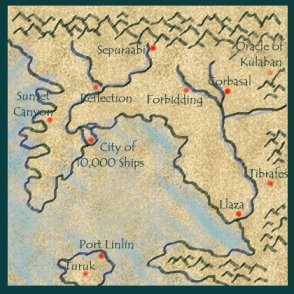The Divine Light of the Ever-Expanding Rays of Splendour, known more simply as the Empire of Splendour or even just The Empire, was born over three thousand years ago when Emperor Divinely Chosen stepped into a pillar of flame and came out unhurt; touched by immortal fire.
 Before the apotheosis of Divinely Chosen, the lands of Utashar were a chaotic rabble of warring states, known as the Wall-Builders after the legacy of earthworks that can still be found scattered across the region. The Immortal Emperor, Guide of Heaven, Lord of the East Sun etc. looked down from his fiery chariot and was inspired to bring law and order to the mortal realms. He sent down the Flame of Heaven and decreed that whoever had the moral conviction to step into the flame would bring the Rule of Law to all the lands beneath the Firmament. Many tried and perished, but it was the man who would become known as Divinely Chosen who had the right mix of courage, duty and wisdom to succeed.
Before the apotheosis of Divinely Chosen, the lands of Utashar were a chaotic rabble of warring states, known as the Wall-Builders after the legacy of earthworks that can still be found scattered across the region. The Immortal Emperor, Guide of Heaven, Lord of the East Sun etc. looked down from his fiery chariot and was inspired to bring law and order to the mortal realms. He sent down the Flame of Heaven and decreed that whoever had the moral conviction to step into the flame would bring the Rule of Law to all the lands beneath the Firmament. Many tried and perished, but it was the man who would become known as Divinely Chosen who had the right mix of courage, duty and wisdom to succeed.
Divinely Chosen carried within his soul the Undying Flame of Heaven, giving him the power to rule justly and to establish the beginnings of the Empire of Splendour. When he died, the Flame passed to the child of one of his subjects, who was discovered by the Priests of the Imperial Flame and raised to become Emperor, and thus it was over the centuries. The Undying Flame of Heaven was reborn in successive mortals worthy of carrying it. The physical part of the Flame of Heaven was kept alight, enshrined, and used to light torches that were carried to the edges of the Empire, there to create new shrines of ever-burning flames. This way, the dream of the Empire endured.
And endure it has, through civil wars, invasions and disasters. At its height, the Empire spanned almost half of the continent of Perfection and hundreds of lands in the Southern Seas. It gave the world a common language, currency, art, public works, engineering, magical disciplines, philosophies, mathematics, a legal and administrative system based upon merit and the rule of law, and much else besides. But the Empire was built upon the forces of Concordance, and in time Concordance crystallises into rigidity and stagnation, and Chaos begins to wax once more. Immovable tradition meant a lack of progress. The great bureaucracy became unwieldy and self-serving, successive Emperors became more and more isolated from their people, provinces became disillusioned with the lack of support from the Imperial Heartland and slipped quietly into independence. The Empire became like the tiger that sleeps whilst mice steal its fur for their nests.
Much that was great about the Empire has been inherited by those former vassal nations that managed a smooth path to independence. The rule of law, that holds all men and women equal no matter their birth; the vibrant and adaptable language of Low Imperial; philosophies of the great sages; the system of Magisters Administory and Judiciary that awards rulership on the basis of ability rather than birth; paid military; registered magicians; cultural events, medicine, a calender, religious festivals and the inclusive and lively pantheon of the Ten Thousand Immortals all live on in many different nations, giving ties that unite them and allowing communication and commerce.
The Empire is not dead yet, however. Although reduced to three heartland provinces: the fertile plains of Utashar, the mountain kingdom of Ut'Bharma and the canyons of Dronistor, and although the capital city, Reflected Glory, is largely a crumbling ruin inhabited by lawless gangs, still the sleeping tiger dreams of power and may one day awaken.
(c) 2006 The Creative Conclave.
Contact us.




